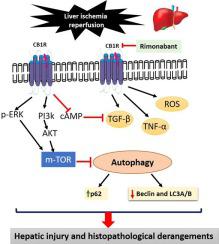International Immunopharmacology ( IF 4.8 ) Pub Date : 2021-09-15 , DOI: 10.1016/j.intimp.2021.108140 Samar Rezq 1 , Reham Hassan 1 , Mona F Mahmoud 1

|
Hepatic ischemia/reperfusion (HIR), which can result in severe liver injury and dysfunction, is usually associated with autophagy and endocannabinoid system derangements. Whether or not the modulation of the autophagic response following HIR injury is involved in the hepatoprotective effect of the cannabinoid receptor 1(CB1R) antagonist rimonabant remains elusive and is the aim of the current study. Rats pre-treated with rimonabant (3 mg/kg) or vehicle underwent 30 min hepatic ischemia followed by 6 hrs. reperfusion. Liver injury was evaluated by serum ALT, AST, bilirubin (total and direct levels) and histopathological examination. The inflammatory, profibrotic and oxidative responses were investigated by assessing hepatic tumor necrosis factor α (TNFα), nuclear factor kappa B (NF-κB), transforming growth factor (TGF-β), lipid peroxidation and reduced glutathione. The hepatic levels of CB1R and autophagic markers p62, Beclin-1, and LC3 as well as the autophagic signaling inhibitors ERK1/2, PI3K, Akt and mTOR were also determined. Rimonabant significantly attenuated HIR-induced increases in hepatic injury, inflammation, profibrotic responses and oxidative stress and improved the associated pathological features. Rimonabant modulated the expression of p62, Beclin-1, and LC3, down-regulated CB1R, and dcreased pERK1/2, PI3K, Akt, and mTOR activities. The current study suggests that rimonabant can protect the liver from IR injury at least in part by inducing autophagy, probably by modulating ERK- and/or PI3K/AKT-mTOR signaling.
中文翻译:

利莫那班改善大鼠肝缺血/再灌注损伤:通过调节 ERK 和 PI3K/AKT-mTOR 途径参与自噬
肝缺血/再灌注(HIR)可导致严重的肝损伤和功能障碍,通常与自噬和内源性大麻素系统紊乱有关。 HIR 损伤后自噬反应的调节是否与大麻素受体 1 (CB1R) 拮抗剂利莫那班的保肝作用有关,目前尚不清楚,这也是本研究的目的。用利莫那班 (3 mg/kg) 或媒介物预处理的大鼠经历 30 分钟的肝缺血,然后是 6 小时。再灌注。通过血清 ALT、AST、胆红素(总胆红素和直接水平)和组织病理学检查评估肝损伤。通过评估肝肿瘤坏死因子α (TNFα)、核因子κB (NF-κB)、转化生长因子(TGF-β)、脂质过氧化和还原型谷胱甘肽来研究炎症、促纤维化和氧化反应。还测定了 CB1R 和自噬标记物 p62、Beclin-1 和 LC3 以及自噬信号抑制剂 ERK1/2、PI3K、Akt 和 mTOR 的肝脏水平。利莫那班显着减轻 HIR 诱导的肝损伤、炎症、促纤维化反应和氧化应激的增加,并改善相关的病理特征。利莫那班调节 p62、Beclin-1 和 LC3 的表达,下调 CB1R,并降低 pERK1/2、PI3K、Akt 和 mTOR 活性。目前的研究表明,利莫那班至少部分通过诱导自噬(可能是通过调节 ERK-和/或 PI3K/AKT-mTOR 信号传导)来保护肝脏免受 IR 损伤。











































 京公网安备 11010802027423号
京公网安备 11010802027423号